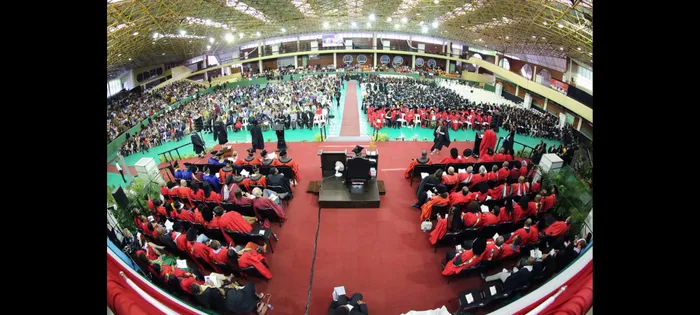
About 1 500 graduating students at the University of KwaZulu-Natal’s spring graduation. The writer says today we mass-produce doctoral graduates like factory widgets, sacrificing quality at the altar of quantity.
Image: File/Supplied
I WOULD like to address an aspect which has been bothering me for quite some time now. I hope that it will be read critically without necessarily creating any unnecessary consternation.
If it does, I would let John Stuart Mill, in his book On Liberty defend me when he posits that: “The peculiar evil of silencing the expression of an opinion is, that is robbing the human race; posterity as well as the existing generations; those who dissent from the opinion, still more than those who hold it. If the opinion is right, they are deprived of the opportunity of exchanging error for truth: if wrong, they lose, what is almost as great a benefit, the clearer perception and livelier impression of truth, produced by its collision with error.”
There was a time when the words “Doctor of Philosophy” carried weight — a sacred trust between society and its thinkers. Today, I watch with growing dismay as we mass-produce doctoral graduates like factory widgets, sacrificing quality at the altar of quantity. The brain, as Carl Sagan reminded us, “is like a muscle. When it is in use, we feel very good. Understanding is joyous.” Yet, where is this joy in our current academic landscape?
Mediocrity has become our unwritten curriculum. It manifests in doctoral theses that contribute nothing but recycled platitudes, in supervisors who prioritise speedy completions over substantive work, and in universities that measure success by graduation statistics rather than intellectual impact. I recall one particularly egregious example: A doctoral candidate whose entire thesis concluded that “corruption will never end”. This wasn’t scholarship — it was intellectual surrender dressed in academic regalia.
Alfred North Whitehead saw this coming nearly a century ago when he warned: “The race which does not value trained intelligence is doomed. Not all your heroism, not all your social charm, not all your wit, not all your victories on land or at sea, can move back the finger of fate.” His words haunt me as I review dissertation after dissertation that fail to meet even basic standards of original thought.
The problem runs deeper than individual failings. We’ve created a system that actively discourages excellence. Consider these disturbing trends:
The Rise of the Administrative Mind:
The great social critic Neil Postman saw this coming when he argued that television had transformed education into “edutainment”. His warning applies equally to our current digital age: “Our bewilderment has resulted from our notion that salvation depends on information. The remedy may be a return to the process of rational thought.”
Similarly, Nicholas Carr's research in *The Shallows* demonstrates how “the internet is literally rewiring our brains and inducing only superficial understanding”. Is it any wonder our doctoral candidates struggle with deep, sustained thought when their entire education has conditioned them for distraction?
All is not lost. We can reclaim academia's soul by:
To my colleagues: We became academics because we believed in the life of the mind. Let us have the courage to demand more from our students, from our institutions, and most importantly, from ourselves. The administrative machinery will always push for more graduates, faster completions, and easier standards. We must be the counterweight.
To aspiring scholars: seek not just a degree, but an education. As my grandfather, Zacharia Nkosi, would say: “True wisdom isn’t measured by titles, but by what you build with what you’ve learned.”
The choice before us is stark but simple: Will we be remembered as caretakers of a great tradition, or as the generation that presided over its decline? The towers of academia still stand, but their light grows dim. It falls to us to rekindle it.
NB: The piece is dedicated to my late maternal grandfather, Zacharia Nkosi. A man who had an amazing, imperturbable demeanour and who always remained quiet throughout the week and only laughed when he was tipsy during weekends. A strict disciplinarian who normally communicated through facial expressions. A very loving grandfather, though, whose sagacity was the envy of his contemporaries.
* Dr Vusi Shongwe works in the Department of Sport, Arts, and Culture in KwaZulu-Natal and writes in his personal capacity.
** The views expressed here do not reflect those of the Sunday Independent, IOL, or Independent Media.